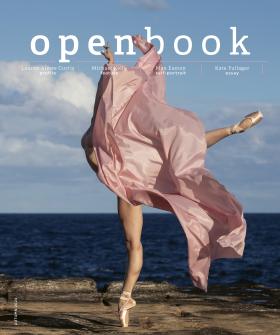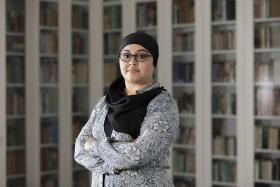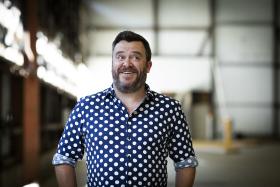We tend to rationalise the suffering of others as if it were a condition of living. All the world is pain, we say, so we begin to rank and itemise it. There are whole projects devoted to this dispassionate logic, not least of all the ones that dwell in our own minds. We obsess over those who ‘deserve’ an alleviation of their suffering and those who, we try to tell ourselves, have brought it on themselves and must end it for themselves. We work at drawing that distinction.
It is easy to convince such a rational mind that this is the work of compassion; that we must save our stores of it for the ‘right’ ones.
The reality, of course, is that our hierarchy of hurt — different for every one of us according to our own experiences — is just another unfeeling algorithm. True kindness is offered without judgment. To attach caveats to caring erases the human. While each person alive on this planet is a similar collection of atoms, everything else is deeply strange and inscrutable. Our best guesses at what motivates or drives other people are like dying embers in the dead of night; feeble, revealing little.
In a Life magazine interview in 1963, the celebrated African-American writer James Baldwin offered an insight into how we may have mixed the signals of our own suffering. Knowing we have suffered is not the same as looking it in the eye. Kindness springs from the latter, not necessarily the former.
‘You think your pain and your heartbreak are unprecedented in the history of the world,’ he said, ‘but then you read.’
‘It was Dostoevsky and Dickens who taught me that the things that tormented me most were the very things that connected me with all the people who were alive, or who ever had been alive. Only if we face these open wounds in ourselves can we understand them in other people.’
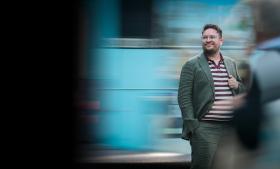
For 32 years, I thought my ailments and hang-ups were a species of anxiety. But the condition ran deeper even than that.
Being given a name and an understanding of what was going on behind my eyes was useful. More powerfully still, it felt like being handed special goggles that reveal the secret code written into all our lives. Speaking with others about this only confirmed the precision of the insight.
This sensation, of being able to peer into the hinterland of those around you and see the way trauma has worn tracks in their being, is akin to learning a new word and suddenly hearing it everywhere you turn for the next few weeks. This happened to me many years ago with the word discombobulated, which, on my personal discovery, seemed to be mentioned on television or in books or newspapers every other day. So it goes for trauma.
The poet Naomi Shihab Nye colours in Baldwin’s idea in her poem Kindness, which has done much to lay the groundwork for the deployment of my secret goggles. She writes:
Before you know kindness as the deepest thing inside,
you must know sorrow as the other deepest thing.
You must wake up with sorrow.
You must speak to it till your voice
catches the thread of all sorrows
and you see the size of the cloth.
This is not to say that all people who have known a bone-weary sorrow will inherit a generosity of spirit. It is not enough, as Baldwin says, to have experienced it. We must turn and look it in the face.
It is in the turning — holding our pain up to the light and examining it as a jeweller might a gemstone — that we can dismantle the defensive structures erected in our own honour. I am acutely aware that some cannot or do not make it this far. For the longest time, I thought I might be one of them.
My original hurt, spent alone at age seven on a remote cattle station alongside a father who openly cheated with a 19-year-old governess while my mother and sister were in a burns ward tending to my critically ill brother 1200 km away, shut me down. The intensity of that loneliness, the silent pleading for comfort from my father, provided the heat that could weld me closed. I wanted more from the world than this diminishment, naturally, but no longer trusted love would be forthcoming.
This is the secret sauce to trauma’s longevity: mistrust. It is the liquid sand at the foundation of your life. I was almost brought undone by it.
I tried to be kind nevertheless, and frequently managed it in my early adult life. But just as often I was cynical and filled with a disturbing anger. It wasn’t directed at anyone in particular but everyone at various points in time received it. Anger was like a forcefield that kept others at bay. It was the concrete dome lowered atop the Chernobyl reactor to protect what I understood to be my radioactive core; the part of me that was so grotesque that not even my father could love it.
How easy it is, in the throes of this thinking, to believe you are doing everyone else a favour. In such a holding pattern, kindness becomes a fluke rather than an outcome of your own design.
I rationalised my own misery and projected the account of it on to everyone else. What I did not do, for a third of my life, was be kind to myself first.
Perhaps that is the hardest kindness.
Part of the disease of codifying the things about human nature that are not begging to be analysed in that way is that we become lost.
Take the great evolutionary biologist, mathematician and chemist George Price. Having already cracked the code of Darwin’s natural selection by reducing it to a simple equation, he turned his attention to altruism. He wanted to know why it was that someone should be ‘nice’ or expend energy caring for someone outside their own gene pool. What evolutionary imperative could possibly explain such kindness?
Price had left his own wife and children for this pursuit, and would eventually give away everything he owned. Gripped by madness, he took his own life in a squat house in London.
It feels unkind to point out that Price was preoccupied with the wrong campaign. Intent doesn’t really come into it. There is no need to account for why anyone is kind.
It matters only that we are. Sure, it feels good. You’d need to be the owner of a black heart indeed to feel otherwise.
In My Year of Living Vulnerably I cite a recent Oxford University study of 683 people which revealed that it did not matter whether a random act of kindness was directed at family members, an acquaintance, a total stranger or even yourself. The results were the same: performing these acts made participants happier. Curiously, the study found that even the simple act of paying attention to someone else performing an act of kindness is more than enough to render us content or happy.
It is important to be clear that happiness is not something you can conjure from thin air. Much of our modern malaise — you know, apart from the indignities of late-stage capitalism, the culture wars and the broader rise of various types of fascism — can be linked to this vague sense that we should be happy but are, in fact, not. You can’t get out of bed one morning and run to the store to purchase happiness. If you could, I suspect many writers would be out of a job.
You can, however, choose to be kind. This is a necessary condition for true happiness. Not the only one, certainly, but a major one.
This is where we need to look our own suffering in the eye and come to terms with it. Now, one does not need to become best friends with suffering. There is no need
to braid its hair or rent a cabin for a weekend of fishing. But we must find a place for it. We must see the way it has pressed its amorphous presence into the shape of our lives.
Failure to do so is one of the reasons it is so easy for someone to resist giving money to a homeless man, for example. ‘He’s just going to spend it on booze or drugs,’ you can almost hear them say.
So?
In the immortal words of musical act Lazyboy: ‘Wait a second. That’s what I’m going to spend it on.’
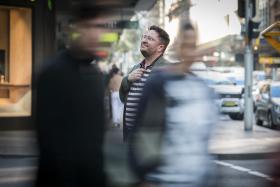
Kindness is not a structural solution. Twenty dollars is not going to give the homeless person enough money to cover bond. It won’t get them into TAFE. Being generous or simply smiling at another person isn’t going to fix their broken marriage or bring back a dead relative. That almost strikes upon the point though, doesn’t it? So much else is pain, we need not add to it. Perhaps we can soften its edges just a little.
If we cannot flex this muscle, the state flexes another in return.
That may seem like a strange leap to make so I want to be as clear as possible: the same mental process that sees some of us choose who is deserving of kindness, or refuse it altogether, is writ large at the scale of government policy.
We need not look far to find it.
In the welfare system mistrust is built into its common features. Robodebt grew from a latent distrust of payment recipients into a program that criminalised them. All the while, as we now know, it was the government that was stealing from them. Those unlawful debts were never real.
Employment services, similarly, operate on a model that forces people to spend so much time proving they are looking for work or working for free in dead-end, punishing programs that most of the multi-billion-dollar apparatus outsourced by government to oversee them is tied up with policing these useless errands. The managers of the National Disability Insurance Scheme have swung their focus from providers of services to participants themselves and whether they are being ‘compliant’. No evidence has ever existed that they are not, by the way, but that fact can’t soothe the lust of a machine built to appeal to reason.
In other realms, too, the state privatises its duty of care to ‘civil society’ which is really just code for the assumption that kindness has no role in policy.
No reason is needed to be kind. Kindness is the reason. It multiplies, as if by cellular division. See how it grows.
Discussions about whether we are being kind to the ‘right’ people always remind me of that great climate change cartoon in which a denier of the science asks in earnest: what if we cut emissions and make the air cleaner and the world greener for nothing?
When you have been given the special vision of trauma, the knowledge of its fingerprints across the life of all those around you, you realise that it is impossible to waste kindness.
Perhaps another word for this understanding is love.
Rick Morton is an award-winning journalist, whose latest book is My Year of Living Vulnerably.
This story appears in Openbook winter 2021.

